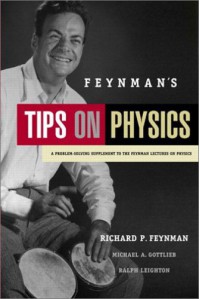Raw Feynmanese: "Feynman Tips on Physics"


Published July 31st 2005
I’ve read almost everything Feynman related. A few still remain to be read: Perfectly Reasonable Deviations from the Beaten Track: The Letters, Feynman's Thesis: A New Approach to Quantum Theory, and Feynman Lectures on Computation.
My first contact with Feynman happened in my first year of college. My physics’ teacher at the time was responsible for that. He introduced me to the marvelous world of The Feynman Lectures on Physics, and I was never the same. I used the 3 volumes for all of my physics classes (Mechanics, Electromagnetism, Thermodynamics, etc). I still remember my math classes (Infinitesimal Analysis I, II, III, IV) also gained immensely by my immersion in Feynman’s lectures. For those of you who aren’t familiar with The Bible, it’s full of tips and tricks, ie, short-cuts to able to get to the solutions faster than it’s normally possible. My grades in all of these classes greatly benefited. The Feynman lectures shouldn’t be used as a primary textbook for Quantum Mechanics, Mechanics, or Electromagnetism. Not because the 3 volumes are technically difficult, but because it's not very useful for learning technique. For that I used a more prosaic textbook. I don’t recall which one, but I still remember the Feynman Lectures.
Why is that you wonder? Feynman was unique due to his explanatory and not-trivial approach to Physics. Leighton beautifully summaries what made Feynman one of a kind teaching-wise (I’m not getting into his contributions to Physics in terms of QED, Quantum Mechanics and so forth):
“Feynman has a peculiar property, which is that at the time he’s explaining something, it appears very clear and transparent – you can see how everything fits, and you go away feeling very good about it. [ ]And two hours later, like what they say about Chinese food, it’s all gone and you’re hungry again. And you don’t remember quite what happened.”
Exactamundo!
This book can be regarded as a complement to the Red Books: It contains four previously unpublished lectures that Feynman gave to students preparing for exams.
“And you can re-create the things that you’ve forgotten perpetually – if you don’t forget too much, and if you know enough. In other words, there comes a time – which you haven’t quite got to, yet – where you’ll know so many things that as you forget them, you can reconstruct them from the pieces that you can still remember. It’s therefore of first-reta importance that you know how to “triangulate” – that is, to know how to figure something out from what you already know. It’s absolutely necessary. You might say ‘Ah, I don’t care; I’m a good memorizer! I know how to really memorize! In fact, I took a course in memory!’ That still doesn’t work! Because the real utility of physicists – both to discover new laws of nature, and to develop new things in industry, and so on - is not to talk about what’s already known, but to do something new – and so they “triangulate” out from the known things: they make a triangulation that no one has ever made before.”
This was Feynmanese at its best. In other words, you don’t need to memorize stuff to do well in school. I followed this to the letter. That’s why when I was in college my notes were very sparse. I very much preferred to listen in class, taking a few notes here and there. When the going got tough, ie, when taking the exams, I was almost always quite in good shape. Unfortunately this approach didn’t quite work out in subjects different from Physics, Math, etc…For that I’d need memorization, which I quite hated, and I still do. In math and Physics classes when I needed a particular formula and I didn’t know it by heart, as it was almost always the case, I’d try to deduce it from first principles or somesuch. Sometimes I’d get far behind in the exam, but most of the the time I’d plenty of time to spare when using this approach in each exam.
Since the lectures in this book as supplement are introductory, everything in here just becomes second nature, ie, it doesn't matter that they are vintage. The old stuff should just be easier, because it’s already out there. If one finds something in the Feynman Lectures and in this book which isn't completely obvious, one should study it until it is obvious--- there's no barrier, the things are self-contained. And I still think that the Red Books and this supplemental volume can give us a different perspective on how to learn physics in a different way, because everything is worked out from scratch. This makes them very interesting, because you learn how the discovering gets done, the type of reasoning, the physical intuition, and so on.
If you're into Physics and Science in general, it doesn't get much better than this.
 2
2
 2
2



